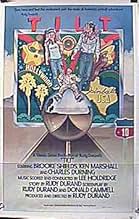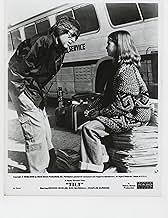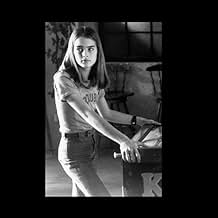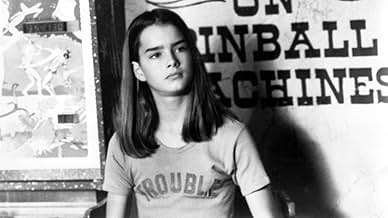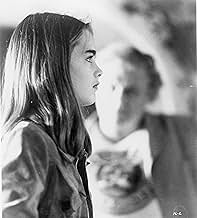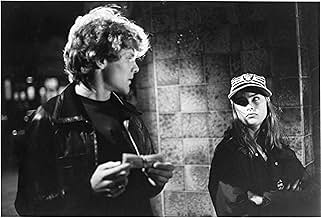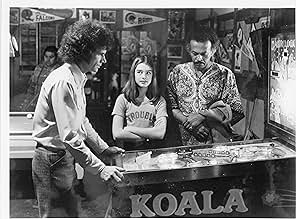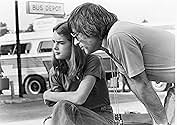A teenage pinball prodigy meets a struggling country singer at Mickey's Bar after hustling a gambler. He convinces her to join him on the road using her skills to earn money for his demo tap... Read allA teenage pinball prodigy meets a struggling country singer at Mickey's Bar after hustling a gambler. He convinces her to join him on the road using her skills to earn money for his demo tape.A teenage pinball prodigy meets a struggling country singer at Mickey's Bar after hustling a gambler. He convinces her to join him on the road using her skills to earn money for his demo tape.
Rob Berger
- Replay
- (as Robert Brian Berger)
Featured reviews
There are elements here we've definitely seen elsewhere, and at its roots it's a classic story: a little bit of a coming-of-age feel as a skilled youth pairs with an older person who's less than honest, and one way or another the partnership will end badly and/or change them both. With 14-year old Brooke Shields starring there are aspects of school-age humor or dialogue, to say nothing of the bluster and boasting that follows from the pinball match-ups. Still, even for all the playfulness and levity, 'Tilt' seems like it declines some of the more ham-handed hooks and embellishments we'd expect of similar fare from the subsequent four decades. In their stead we get somewhat somber portraits of the seediness, hypocrisy, or judgmental swarthiness of US culture, and some commentary thereon, as well as reflections of the ethics and habits of some of the figures in this tableau. One way or another, though, the core remains fairly straightforward - and if imperfect, it's suitably enjoyable.
There are some definite indelicacies on hand, especially frank, unnecessary, and tired fatphobia surrounding Charles Durning's character. Though their characters' partnership is stated to be strictly business, there's something untoward about the two leads being a 29-year old man and a 14-year old girl. The movie also runs a tad long - did it need to be almost two hours? Put these bits aside, though, and more than anything, the "trouble" with 'Tilt' is that it just isn't especially remarkable in its content; again, we've seen other titles of a like slant. Even at that, though, the cast is actually pretty swell: Shields is perhaps limited somewhat by her youth and inexperience, but her portrayal of "Tilt" Davenport is solid and believable. Durning depicts Mr. Remmens with strong personality, and it's a small delight to see him let loose a little compared to other roles. And while Ken Marshall is hardly a household name, here in his film debut he plays Neil with boyish energy that's a touch endearing. I also think Rudy Durand's direction is quite able, guiding his cast and the orchestration of shots and scenes into the best arrangement they could be. True, one had better like pinball, because there's a lot of footage of machines in play - but I appreciate the detail, and it helps to maintain engagement with a hint of exciting tension even as the picture draws on.
I suppose it could be said that the writing feels slightly imbalanced. Marshall gets the chief spotlight as Neil, even as Shields' character inspires the title of the film. The feature seems to be more about how the course of events changes Neil, and Tilt's story kind of seems unresolved and left blowing on the wind. This is unfortunate, because there was untapped narrative potential between the two of them - alas. Nevertheless, more so than not the plot is reasonably sturdy, if light, and where it leave something to be desired, the scene writing picks up the slack. Each actor appearing here does a great job of carrying scenes by themselves, and are even better as scene partners. And with that, each passing moment we see of the tale being stitched together arguably bears the most value in the screenplay.
If my words seem a smidgen non-committal, consider that an echo of 'Tilt' itself. It's not at all bad, and I had a good time watching it. Only - unless you're a specific fan of someone involved, a pinball connoisseur, or just deeply curious, there's no particular reason to seek this out. You could definitely do a lot worse, however, and to be honest I think it's capable enough to warrant checking it out if you come across it. With the cast and scene writing standing out the most, 'TIlt' is hardly an essential watch, but a pleasant, satisfying, and even quietly rewarding way to pass the time if you have the chance.
There are some definite indelicacies on hand, especially frank, unnecessary, and tired fatphobia surrounding Charles Durning's character. Though their characters' partnership is stated to be strictly business, there's something untoward about the two leads being a 29-year old man and a 14-year old girl. The movie also runs a tad long - did it need to be almost two hours? Put these bits aside, though, and more than anything, the "trouble" with 'Tilt' is that it just isn't especially remarkable in its content; again, we've seen other titles of a like slant. Even at that, though, the cast is actually pretty swell: Shields is perhaps limited somewhat by her youth and inexperience, but her portrayal of "Tilt" Davenport is solid and believable. Durning depicts Mr. Remmens with strong personality, and it's a small delight to see him let loose a little compared to other roles. And while Ken Marshall is hardly a household name, here in his film debut he plays Neil with boyish energy that's a touch endearing. I also think Rudy Durand's direction is quite able, guiding his cast and the orchestration of shots and scenes into the best arrangement they could be. True, one had better like pinball, because there's a lot of footage of machines in play - but I appreciate the detail, and it helps to maintain engagement with a hint of exciting tension even as the picture draws on.
I suppose it could be said that the writing feels slightly imbalanced. Marshall gets the chief spotlight as Neil, even as Shields' character inspires the title of the film. The feature seems to be more about how the course of events changes Neil, and Tilt's story kind of seems unresolved and left blowing on the wind. This is unfortunate, because there was untapped narrative potential between the two of them - alas. Nevertheless, more so than not the plot is reasonably sturdy, if light, and where it leave something to be desired, the scene writing picks up the slack. Each actor appearing here does a great job of carrying scenes by themselves, and are even better as scene partners. And with that, each passing moment we see of the tale being stitched together arguably bears the most value in the screenplay.
If my words seem a smidgen non-committal, consider that an echo of 'Tilt' itself. It's not at all bad, and I had a good time watching it. Only - unless you're a specific fan of someone involved, a pinball connoisseur, or just deeply curious, there's no particular reason to seek this out. You could definitely do a lot worse, however, and to be honest I think it's capable enough to warrant checking it out if you come across it. With the cast and scene writing standing out the most, 'TIlt' is hardly an essential watch, but a pleasant, satisfying, and even quietly rewarding way to pass the time if you have the chance.
10gotoads
I liked this movie. The 1970s seemed like a fun time. Teenagers weren't looked down upon for simply living their lives on their terms. You could be 14, learn a skill, drop out of school, and travel the country supporting yourself or even yourself and a friend. Every day would be an adventure. And when you think about it, that's the way it should always be. I know that pinball isn't as popular as it once was but there are plenty of other things that can be mastered in the modern era. But today, busybodies will ultimately destroy whatever dream you have. It's really nothing more than pathetic jealousy. I give this film 8/10 stars for its entertainment value and a bonus 2 stars for being bold and inspirational. There is a great lesson when Tilt Davenport and The Whale battle each other at the end. I won't spoil it for you. Just trust me when I say you won't be disappointed.
For almost ten years, writer/agent Rudy Durand had tried to turn his story about the world of pinball machines into a movie. Eventually writing the screenplay himself, he sent a copy of it to Orson Welles. Welles read the screenplay and liked it so much that he spoke to Durand about it and recommended that Durand direct it himself. Welles then talked glowingly about the screenplay on "The Tonight Show. The phone calls began to come in for Durand, who was offered as much as $900,000 for the screenplay. Unfortunately, all such offers called for a more seasoned director than Durand, who wanted control over filming. Finally, real estate developer Mel Simon, who dabbled in independent productions (i.e. the "Porky's" movies), offered to fund the film and to give Durand full control over creative content.
Welles wasn't avaiable to play the part of the Whale, but veteran character actor Charles Durning was an excellent replacement. Much padding was added to the clothing of the already-hefty Durning, and much makeup was applied to make him look more weathered than he really was. Newcomer Ken Marshall was cast as Neil Gallagher, and an assortment of "B" actors filled out the other minor parts. Durand's first two choices for the role of Tilt were Jodie Foster, who wasn't interested, and Tatum O'Neal, who wasn't avaialble. Brooke Shields' mother Teri Shields was more than happy to get her daughter on the screen again. Filming began in late 1977 and ran for five months. Except for a few on-location shots in Corpus Christi, shooting was mainly in the L.A. area.
After Durand put together his director's cut of the film, it and all footage were sent on to distributor Warner Brothers. The studio decided to create its own version, which was eventually sent out to theaters in April of 1979. It bombed and saw limited theatrical release, although it was shown frequently on late-night cable TV in the 1980's, notably on TBS. To say that Durand was unhappy about Warner deciding to use its own version, rather than his, would be a major understatement. He asked the studio to rerelease his version of the movie. When the studio refused, he sued them, representing himself in court appearances. Thirteen years and over 150 court appearances later, including before the California Supreme Court, he was awarded a large, but undisclosed settlement. Unfortunately, Durand never did release his version of the film commercially. The film as we know it has been largely forgotten, and only a VHS version was ever released by Warner, although at least one copy exists on YouTube. It may be possible to purchase a copy of Mr. Durand's version from him.
Except for Durning, John Crawford, and possibly Shields, the acting in the movie is somewhat bland to say the least. You can find reviews of the movie elsewhere. Remember that you're seeing reviews of Warner's release of the movie. Durand's version had to be much better. I am certain of this, because Orson Welles wouldn't have gone on national TV to praise the version that appeared on screen. In light of that, I want to focus on the footage towards the end of the movie, when Tilt goes to see Mr. Remmens/"The Whale" (to give more details would require putting a "spoiler" notice on this review). This appears to be one of the areas of the movie that was altered the least by the editors at Warner. The manner in which the amused Remmens handles the self-assured (and somewhat mouthy) Tilt, and the way that he eventually warms to her by the end of their encounter, is a case study in character acting by one of the masters of the art. Durning is superb throughout the movie, but the scene with Shields is especially good. There is nothing wooden or artificial about this scene, and I wouldn't be surprised if Durning helped Shields through its performance. If you find the movie (and it's online at a popular video location), watch this scene carefully to see what I mean.
Welles wasn't avaiable to play the part of the Whale, but veteran character actor Charles Durning was an excellent replacement. Much padding was added to the clothing of the already-hefty Durning, and much makeup was applied to make him look more weathered than he really was. Newcomer Ken Marshall was cast as Neil Gallagher, and an assortment of "B" actors filled out the other minor parts. Durand's first two choices for the role of Tilt were Jodie Foster, who wasn't interested, and Tatum O'Neal, who wasn't avaialble. Brooke Shields' mother Teri Shields was more than happy to get her daughter on the screen again. Filming began in late 1977 and ran for five months. Except for a few on-location shots in Corpus Christi, shooting was mainly in the L.A. area.
After Durand put together his director's cut of the film, it and all footage were sent on to distributor Warner Brothers. The studio decided to create its own version, which was eventually sent out to theaters in April of 1979. It bombed and saw limited theatrical release, although it was shown frequently on late-night cable TV in the 1980's, notably on TBS. To say that Durand was unhappy about Warner deciding to use its own version, rather than his, would be a major understatement. He asked the studio to rerelease his version of the movie. When the studio refused, he sued them, representing himself in court appearances. Thirteen years and over 150 court appearances later, including before the California Supreme Court, he was awarded a large, but undisclosed settlement. Unfortunately, Durand never did release his version of the film commercially. The film as we know it has been largely forgotten, and only a VHS version was ever released by Warner, although at least one copy exists on YouTube. It may be possible to purchase a copy of Mr. Durand's version from him.
Except for Durning, John Crawford, and possibly Shields, the acting in the movie is somewhat bland to say the least. You can find reviews of the movie elsewhere. Remember that you're seeing reviews of Warner's release of the movie. Durand's version had to be much better. I am certain of this, because Orson Welles wouldn't have gone on national TV to praise the version that appeared on screen. In light of that, I want to focus on the footage towards the end of the movie, when Tilt goes to see Mr. Remmens/"The Whale" (to give more details would require putting a "spoiler" notice on this review). This appears to be one of the areas of the movie that was altered the least by the editors at Warner. The manner in which the amused Remmens handles the self-assured (and somewhat mouthy) Tilt, and the way that he eventually warms to her by the end of their encounter, is a case study in character acting by one of the masters of the art. Durning is superb throughout the movie, but the scene with Shields is especially good. There is nothing wooden or artificial about this scene, and I wouldn't be surprised if Durning helped Shields through its performance. If you find the movie (and it's online at a popular video location), watch this scene carefully to see what I mean.
One of the many things I miss about the late 70's is that the kid's movies back then we're often completely inappropriate for children. Maybe it was because our irresponsible parents were off snorting coke at discos or having wife-swapping "key" parties, and they just didn't care what the hell we were watching when they gave us three bucks and sent us down to the local cinema. Still, if I had to choose between that kind of parental neglect and having the kind of modern-day "helicopter" parent who insist on going to movies with their kids or calling them right after on their GPS-tracked cellphones to "discuss" whatever they've just seen, I'm afraid I'd choose the late 70's any day. But I digress. . .
Brooke Shields was famous when she was young for appearing in movies that were usually not appropriate for someone her age to see. A lot of these movies really sexualized her, especially the more "respectable" ones like "Pretty Baby" and "The Blue Lagoon". This one doesn't do that at least; it's much more weird. Thirteen-year-old Brooke plays a runaway, but she doesn't resort to prostitution or drugs like a normal runaway, no, she's a pinball hustler. She hooks up with an older guy, who was also once a pinball hustler, but is now a (very bad) country singer. They hatch a scheme to finance his music career through pinball hustling, but they make a detour back to his hometown of New Orleans in order to try take on his old nemesis, an overweight hustler called "the Whale" (Charles Durning).
First off, pinball hustling?!--c'mon. Who the hell ever heard of that? The plot is stupid, the music is bad, the acting, generally, is horrid (even Brooke Shields looks good relatively). But Charles Durning gives a performance that is WAY too good for this movie, and the twist his grossly overweight crime-boss type character takes at the end is very interesting. The screenplay was actually written by talented Hollywood maverick Donald Cammell (who was actually English), and it occasionally shows through the incompetent directing of Rudy Durand and the terrible acting of pretty much everyone but Durning. And lest you think this movie might be too appropriate for children, there are scenes like the one where one of my favorite 70's character actors, Geoffrey Lewis (sidekick of Clint Eastwood/father of Juliette), shows up as a horny trucker who picks up a hitchhiking Brooke and hits on her, but then gets offended and calls her a "prevert" when she facetiously offers to do a three-way with his wife! This is by no means good, but they literally do not make movies like this anymore, only in that much more morally confused--but much more honest-- time called the 1970's.
Brooke Shields was famous when she was young for appearing in movies that were usually not appropriate for someone her age to see. A lot of these movies really sexualized her, especially the more "respectable" ones like "Pretty Baby" and "The Blue Lagoon". This one doesn't do that at least; it's much more weird. Thirteen-year-old Brooke plays a runaway, but she doesn't resort to prostitution or drugs like a normal runaway, no, she's a pinball hustler. She hooks up with an older guy, who was also once a pinball hustler, but is now a (very bad) country singer. They hatch a scheme to finance his music career through pinball hustling, but they make a detour back to his hometown of New Orleans in order to try take on his old nemesis, an overweight hustler called "the Whale" (Charles Durning).
First off, pinball hustling?!--c'mon. Who the hell ever heard of that? The plot is stupid, the music is bad, the acting, generally, is horrid (even Brooke Shields looks good relatively). But Charles Durning gives a performance that is WAY too good for this movie, and the twist his grossly overweight crime-boss type character takes at the end is very interesting. The screenplay was actually written by talented Hollywood maverick Donald Cammell (who was actually English), and it occasionally shows through the incompetent directing of Rudy Durand and the terrible acting of pretty much everyone but Durning. And lest you think this movie might be too appropriate for children, there are scenes like the one where one of my favorite 70's character actors, Geoffrey Lewis (sidekick of Clint Eastwood/father of Juliette), shows up as a horny trucker who picks up a hitchhiking Brooke and hits on her, but then gets offended and calls her a "prevert" when she facetiously offers to do a three-way with his wife! This is by no means good, but they literally do not make movies like this anymore, only in that much more morally confused--but much more honest-- time called the 1970's.
Nothing like 1970's era gaming cheese for some mid-week entertainment. A lot of this movie has over-the-top dialog. Even for it's era. Sit back and enjoy this mindless movie with a bucket of popcorn for some fun pinball times. As with any movie like Tilt, there are many grains of truth stretched beyond their limits. Ignore the frayed cloth and you will enjoy the film.
Did you know
- TriviaWriter-director Rudy Durand tried to get Orson Welles to play The Whale, but Welles was busy with other projects. Welles encouraged Durand to direct the movie himself, and he talked about the script on The Tonight Show Starring Johnny Carson (1962), which helped Durand secure an investor.
- Quotes
Tilt (Brenda Louise Davenport): Why do people get so gross over a game?
- Crazy credits"Game Over" flashes on the screen at the end, in place of "The End."
- Alternate versionsThe original cut of the film ran 111 minutes. When the film opened poorly, director Rudy Durand re-cut the movie, shaving it down to 100 minutes. Both cuts of the film were subsequently released on television and home video.
- ConnectionsReferenced in The Big Box: To the Devil a Daughter (2009)
- SoundtracksKoala Shuffle
Composed and Arranged by Bill Wray
- How long is Tilt?Powered by Alexa
Details
- Runtime1 hour 51 minutes
- Sound mix
- Aspect ratio
- 2.35 : 1
Contribute to this page
Suggest an edit or add missing content


